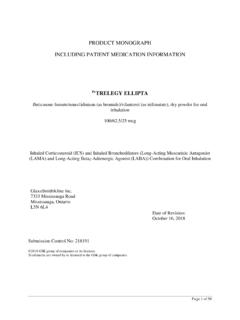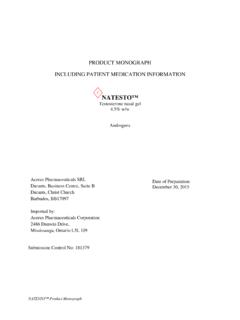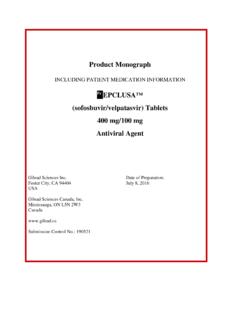Transcription of PRODUCT MONOGRAPH INCLUDING PATIENT …
1 ADLYXINE - PRODUCT MONOGRAPH Page 1 of 79 PRODUCT MONOGRAPH INCLUDING PATIENT medication information Pr ADLYXINE lixisenatide injection mg per mL (10 g/dose) mg per mL (20 g/dose) Solution for Injection in a pre-filled pen ATC Code: A10BJ03 Glucagon-like peptide-1 (GLP-1) analogues Sanofi-Aventis Canada Inc. 2905 Place Laval, Quebec H7V 0A3 Date of Preparation: May 23, 2017 Submission Control No: 193862 ADLYXINE - PRODUCT MONOGRAPH Page 2 of 79 Table of Contents PART I: HEALTH PROFESSIONAL information ..3 SUMMARY PRODUCT information ..3 INDICATIONS AND CLINICAL USE ..3 CONTRAINDICATIONS.
2 4 WARNINGS AND PRECAUTIONS ..4 ADVERSE REACTIONS ..7 DRUG INTERACTIONS ..13 DOSAGE AND ADMINISTRATION ..16 OVERDOSAGE ..18 ACTION AND CLINICAL PHARMACOLOGY ..18 STORAGE AND STABILITY ..25 SPECIAL HANDLING INSTRUCTIONS ..25 DOSAGE FORMS, COMPOSITION AND PACKAGING ..25 PART II: SCIENTIFIC information ..27 PHARMACEUTICAL information ..27 CLINICAL TRIALS ..28 DETAILED PHARMACOLOGY ..39 TOXICOLOGY ..39 PATIENT medication information ..43 INSTRUCTIONS FOR USE Starter Pack ..50 INSTRUCTIONS FOR USE 10 mcg Pen ..60 INSTRUCTIONS FOR USE 20 mcg Pen ..70 ADLYXINE - PRODUCT MONOGRAPH Page 3 of 79 Pr ADLYXINE lixisenatide PART I: HEALTH PROFESSIONAL information SUMMARY PRODUCT information Route of Administration Dosage Form / Strength Clinically Relevant Nonmedicinal Ingredients Subcutaneous Solution for injection, in prefilled pen: 10 g/dose ( mg/mL) 20 g/dose ( mg/mL) For a complete listing see DOSAGE FORMS, COMPOSITION AND PACKAGING section.
3 INDICATIONS AND CLINICAL USE ADLYXINE (lixisenatide injection) is indicated for use as an adjunct to diet and exercise to improve glycemic control in adult patients with type 2 diabetes mellitus in combination with: metformin, a sulfonylurea (alone or with metformin) pioglitazone (alone or with metformin), a basal insulin (alone or with metformin), when the therapy listed above does not provide adequate glycemic control (see CLINICAL TRIALS). Limitations of Use ADLYXINE has not been studied with short acting insulin. ADLYXINE should not be used in patients with type 1 diabetes mellitus or for the treatment of diabetic ketoacidosis.
4 Geriatrics ( 65 years of age): ADLYXINE should be used with caution in patients 65 years and older, since a greater sensitivity of some older individuals cannot be ruled out (see WARNINGS AND PRECAUTIONS Special Populations). Pediatrics (<18 years of age): The safety and efficacy of ADLYXINE have not been established in patients younger than 18 years of age, therefore ADLYXINE is not indicated in pediatric patients . ADLYXINE - PRODUCT MONOGRAPH Page 4 of 79 CONTRAINDICATIONS ADLYXINE is contraindicated in patients who are hypersensitive to this drug or to any ingredient in the formulation or component of the container.
5 For a complete listing, see the DOSAGE FORMS, COMPOSITION AND PACKAGING section of the PRODUCT MONOGRAPH . Hypersensitivity reactions, INCLUDING anaphylaxis, have occurred with ADLYXINE (see WARNINGS AND PRECAUTIONS and ADVERSE REACTIONS). WARNINGS AND PRECAUTIONS General ADLYXINE must not be administered by intravenous or intramuscular injection. ADLYXINE pens should never be shared between patients , even if the needle is changed. Carcinogenesis and Mutagenesis Risk of thyroid C-cell tumours: Lixisenatide administration to mice and rats for 2 years resulted in thyroid C-cell neoplasia. C-cell carcinomas were confined to rats at human systemic lixisenatide exposure ratios 35-fold, while increased incidences of C-cell hyperplasia and adenoma occurred at exposure ratios of >128-fold in mice and 9-fold in rats, with a no-effect level not identified in rats (see Part II: TOXICOLOGY section).
6 Other GLP-1 receptor agonists have been shown to cause thyroid C-cell tumours (adenomas and/or carcinomas) at clinically relevant exposures in rats and mice. The relevance of these results to humans has not yet been determined. Until further long-term data in humans are available, caution is advised when prescribing ADLYXINE in patients with a personal or family history of medullary thyroid carcinoma or in patients with Multiple Endocrine Neoplasia syndrome type 2 (MEN 2). Cardiovascular Heart Rate Increase: ADLYXINE causes an increase in heart rate in clinical trials in healthy subjects undergoing serial electrocardiogram (ECG) monitoring and in patients with type 2 diabetes mellitus undergoing 24 hour ambulatory heart rate monitoring (see ACTION AND CLINICAL PHARMACOLOGY Pharmacodynamics).
7 Caution should be observed in patients who have cardiac conditions that might be worsened by an increase in heart rate, such as tachyarrhythmias (see DRUG INTERACTIONS). ADLYXINE - PRODUCT MONOGRAPH Page 5 of 79 PR Interval Prolongation: ADLYXINE causes a prolongation of the PR interval of the ECG (see ACTION AND CLINICAL PHARMACOLOGY Pharmacodynamics). Caution should be observed in patients with pre-existing conduction system abnormalities ( marked first-degree AV block or second- or third-degree AV block) or a history of rhythm disturbances ( tachyarrhythmias). Physicians should counsel their patients concerning the nature and implications of the ECG changes, underlying diseases and disorders that are considered to represent risk factors, demonstrated and predicted drug-drug interactions, symptoms suggestive of arrhythmia, risk management strategies, and other information relevant to the use of the drug (see DRUG INTERACTIONS).
8 Endocrine and Metabolism Hypoglycemia: Use with a sulfonylurea or basal insulin: patients receiving ADLYXINE in combination with a sulfonylurea or basal insulin have an increased risk of hypoglycemia (see ADVERSE REACTIONS). Reduction of the dose of the sulfonylurea or basal insulin may be considered to reduce the risk of hypoglycemia (see DOSAGE AND ADMINISTRATION). Gastrointestinal patients with Severe Gastrointestinal Disease: Use of glucagon-like peptide-1 (GLP-1) receptor agonists, INCLUDING ADLYXINE, is commonly associated with gastrointestinal adverse reactions, INCLUDING nausea, vomiting and diarrhea. ADLYXINE has not been studied in patients with severe gastrointestinal disease, INCLUDING gastroparesis, a history of stomach/gastric surgery, or inflammatory bowel disease, and therefore, the use of ADLYXINE is not recommended in these patients .
9 ADLYXINE can slow gastric emptying, which can reduce the rate of absorption of orally administered drugs (see DRUG INTERACTIONS). Hepatic/Biliary/Pancreas Pancreatitis: Acute pancreatitis, INCLUDING fatal and non-fatal hemorrhagic or necrotizing pancreatitis, has been reported in patients treated with GLP-1 receptor agonists, and cases of pancreatitis have occurred in patients treated with ADLYXINE during clinical trials (see ADVERSE REACTIONS). patients should be informed of the characteristic symptoms of acute pancreatitis, such as persistent, severe abdominal pain, sometimes radiating to the back, and which may or may not be accompanied by vomiting.
10 If pancreatitis is suspected, ADLYXINE should be discontinued and appropriate management initiated promptly. If pancreatitis is confirmed, ADLYXINE should not be restarted. Consider other antidiabetic therapies in patients with a history of pancreatitis or in patients with other risk factors for pancreatitis ( gallstones, alcoholism, or hypertriglyceridemia). ADLYXINE - PRODUCT MONOGRAPH Page 6 of 79 Immune Anaphylaxis and Serious Hypersensitivity Reactions: ADLYXINE is contraindicated in patients with known hypersensitivity to this drug or its contents (see CONTRAINDICATIONS). In clinical trials, there have been cases of anaphylaxis determined to be related to ADLYXINE.

![Thymoglobulin (anti-thymocyte globulin [rabbit]) - …](/cache/preview/a/b/2/e/e/b/8/2/thumb-ab2eeb82468088f352549e7d8dab340f.jpg)
















